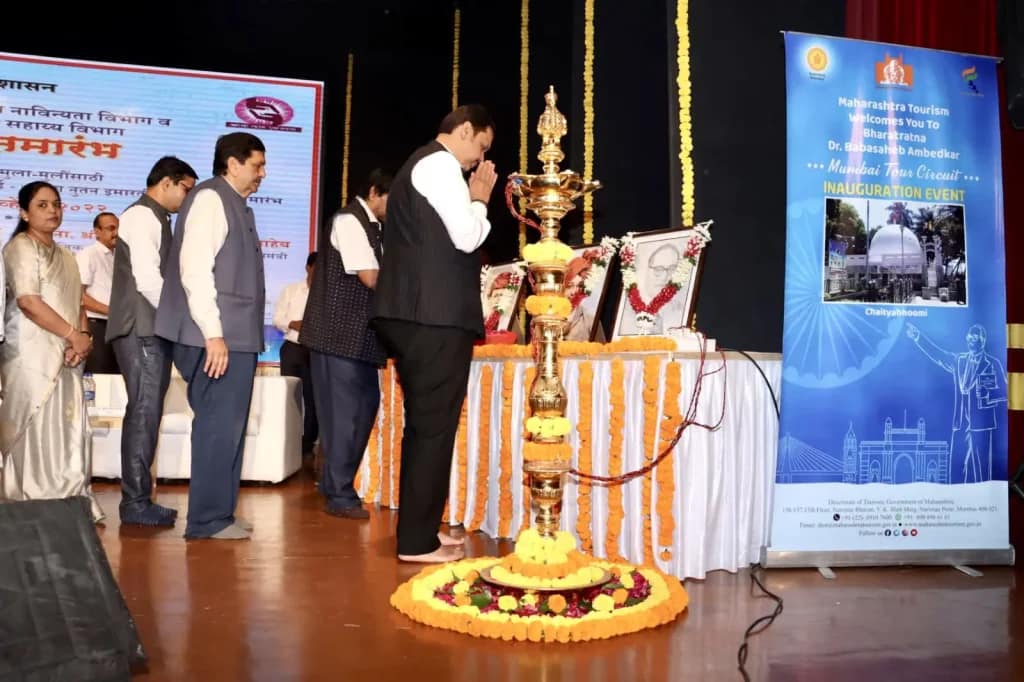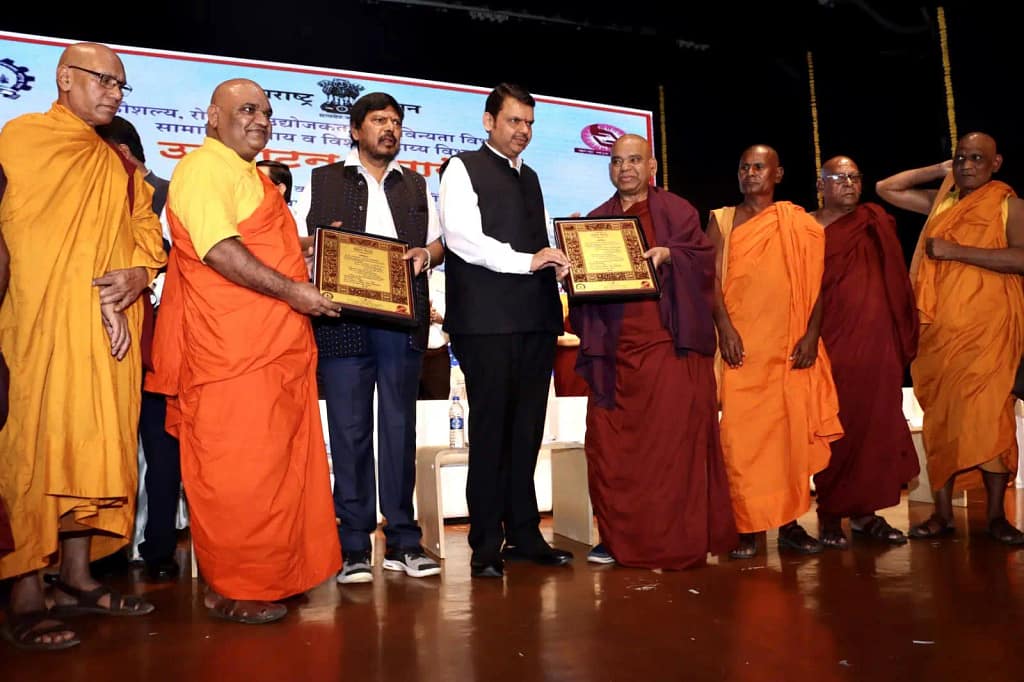Devendra Fadnavis, as the Chief Minister from 2014 to 2019 and later as the Deputy Chief Minister from 2022 to 2024, implemented various beneficial programs and schemes for Scheduled Caste (SC) communities to improve their social, economic, and educational standings. Special efforts were made to achieve the all-round development of the Scheduled Caste communities through the Dalit Settlement Improvement Scheme, Dr. Babasaheb Ambedkar Economic Development Corporation, Dr. Babasaheb Ambedkar Krishi Swavalamban Yojana, Bharat Ratna Dr. Babasaheb Ambedkar Samajik Vikas Yojana, Bharat Ratna Dr. Babasaheb Ambedkar Swadhar Yojana, and Margin Money Yojana. Besides providing financial assistance, these schemes also contributed to entrepreneurship and agriculture in the Scheduled Caste communities, generating sustainable employment opportunities. His government’s focus on the educational and financial empowerment of the Scheduled Tribe communities translated into boosting their morale and self-esteem and reducing social inequalities towards them, giving impetus to building an egalitarian society on the ideas of Baba Ambedkar. Below are the details of some of these schemes:
Margin Money Scheme
The Stand Up India scheme launched by the Central Government in 2015 had set a target of creating 1.25 lakh SC/ST entrepreneurs and 1.25 lakh women entrepreneurs, with provision for incentive grants to the beneficiaries. However, to avail of this scheme, the eligible beneficiaries were expected to pay 25% of their total project cost towards the margin money. But since the new entrepreneurs from the Scheduled Caste and Neo-Buddhist groups wouldn’t have the capacity to pay the 25% margin money, the Devendra Fadnavis government decided to help them by paying up to 15% of their margin money payable to get the benefit of the scheme. So, the eligible new entrepreneurs from the Scheduled Castes and Neo-Buddhist communities in Maharashtra would have to bear only 10% of their project cost, while 75% and 15% of the project cost would be paid by the center and the state, respectively. This way, the youth of the SC/STs were encouraged by the government to start their business by paying a meager 10% of the cost, and live with dignity.
Government Decision – 8 March 2019
Shahu, Phule, Ambedkar Residential School Scheme for 165 Ashram Schools
The Ministry of the Central Government for Social Justice and Empowerment provides subsidies to the ashram schools run by voluntary organizations for the Scheduled Caste boys and girls since 1998-99. A proposal was sent to the central government to include 322 ashram schools in the state in this scheme, against which only 34 ashram schools were approved.
So, as it became difficult for the schools without approval to continue running, the government considered preparing a new scheme after inspecting each of them. Accordingly, the Devendra Fadnavis government decided on March 8, 2019, to start a new scheme in 165 ashram schools. So the subsidy was provided in 2015 to 40 schools categorized in group A, 56 schools in group B, and the 69 schools that did not cooperate with the inspection. The Shahu, Phule, Ambedkar Residential School Scheme was started for these 165 ashram schools from the academic year 2019-20. From 2019-20, these ashram schools were approved for 20% subsidiary grant. Also, rules were made to continue the grant after inspecting the ashram schools every three years. Due to this positive decision of the state government, the schools for the SC/ST children running at their own expense for long, got financial support from the government, and the children also got better facilities for education.
Government Decision – 8 March 2019
Special scheme for the economic upliftment of the Vadar community
The Vadar community in the state should be economically uplifted. With the aim of ensuring that children from this community get proper education and the youth get proper guidance regarding entrepreneurship and jobs, Chief Minister Devendra Fadnavis formed a committee on February 22, 2019, to prepare a special scheme for the Vadar community. Meanwhile, in the cabinet meeting held on January 15, 2019, approval was given to provide an auxiliary grant of Rs 300 crore to the Vasantrao Naik Vimukta Jati and Nomadic Tribes Development Corporation. At the same time, a fund of Rs 100 crore from this grant was approved to implement a special scheme for the economic upliftment of the people of the Vadar and Pardhi communities. The study of the committee formed by the Devendra Fadnavis government in 2019 revealed that the Vadar community in the state has remained economically and socially deprived. For them, the Peilwan Late Maruti Chavan-Vadar Economic Development Corporation was established under the Vasantrao Naik Vimukta Jati and Nomadic Tribes Development Corporation by a government decision dated August 9, 2023, to implement schemes such as seed capital loan scheme, direct loan scheme, individual loan interest repayment scheme, group loan interest repayment scheme, etc. This corporation will work for the welfare and development of the Vadar community. Credit facilities, equipment, technical, and managerial tools are being provided to improve their financial condition.
Under the Peilwan Late Maruti Chavan-Vadar Economic Development Corporation, 25% seed capital scheme, direct loan scheme up to Rs. 1 lakh, individual loan interest repayment scheme up to Rs. 10 lakh, group loan interest repayment scheme up to Rs. 10 – 50 lakh, etc. have been started.
Government Decision – August 9, 2023
मंत्रिमंडळ निर्णय – १५ जानेवारी २०१९ (निर्णय क्रमांक १)
50 new government hostels for backward-class girls
The Devendra Fadnavis government took a decision to open government hostels to facilitate education for girls from the backward classes in the state on the occasion of the 125th birth anniversary of Bharat Ratna Dr. Babasaheb Ambedkar. According to this decision, it was decided to open a total of 50 new government hostels for girls, 7 at the divisional level and 43 at the district and taluka levels, with fooding arrangement on a contract basis. These hostels for girls at the divisional level would have a combined capacity of 250, and those at the district and taluka levels would have a capacity of 100. The government decided to start these fully equipped government hostels for girls on the special occasion of the 125th birth anniversary of Dr. Babasaheb Ambedkar.
Government Decision – 16 December 2015

New norms and rules for the development of memorials of eminent persons
The state government implemented several measures to uplift the Scheduled Castes and Neo-Buddhist communities. These include building memorials of eminent figures from the Scheduled Castes and Neo-Buddhist communities, developing cultural and historical sites, etc. involving NGOs by sanctioning grants to them to carry out such programs. The Devendra Fadnavis government accelerated this work by preparing norms and rules to quickly approve the estimated cost of the projects based on the size and other factors.
Government Decision – 16 December 2015
Bharat Ratna Dr. Babasaheb Ambedkar Swadhar Yojana
The Bharat Ratna Dr. Babasaheb Ambedkar Swadhar Yojana was implemented under the state’s Social Justice Department for the Scheduled Caste and Neo-Buddhist students who failed to get admission in the government hostels. The government hostels are meant for all students, and due to the limited number of hostels, sometimes it may not be possible to accommodate all SC/ST students. Therefore, the government started the Swadhar Yojana, aiming to help such students. Under this scheme, food, accommodation, and study facilities were made available to the Scheduled Caste and Neo-Buddhist students who had taken admission in professional and academic courses after class 11 and 12. For this, the state government directly deposits the amount in the Aadhaar-linked bank account of the students. This govt. scheme for Scheduled Castes was designed to benefit about 25 thousand students.
Government Decision – 6 January 2017
Bharat Ratna Dr. Babasaheb Ambedkar Social Development Scheme
Under this scheme, it was decided to provide water supply, sewage disposal, footpaths, internal roads, public toilets, drains, community temples, libraries, study halls, Dhamma centers, and Vipassana centers at the settlements of Scheduled Castes and Neo-Buddhist communities in urban and rural areas in the state. It was approved to carry out these works involving the corresponding public representatives. Only the proposals sent by Vidyaman Khasdas and MLAs as public representatives would be considered by the government. The state government decided to implement the ‘Bharat Ratna Dr. Babasaheb Ambedkar Social Development Scheme’ from the year 2018-19.
Government Decision – 9 March 2018
Devendra Fadnavis’ schemes for the Scheduled Castes brought about significant changes in the social and economic condition of the people of this community. These initiatives provided opportunities for education, employment and entrepreneurship to the people of the Scheduled Castes and improved their standard of living. The Scheduled Caste community was encouraged through the Pradhan Mantri Adarsh Gram Yojana and other rural development schemes. Special grants were provided under the Pradhan Mantri Awas Gharkul Yojana. Infrastructure facilities were developed in the settlements of the Scheduled Castes under the Adarsh Gaon Yojana. All these schemes have not only provided financial assistance to the citizens of the Scheduled Castes, but also paved the way for social prestige and self-reliance. These efforts of the Fadnavis government have taken important steps towards building an egalitarian and strong society.
संबंधित लेख

